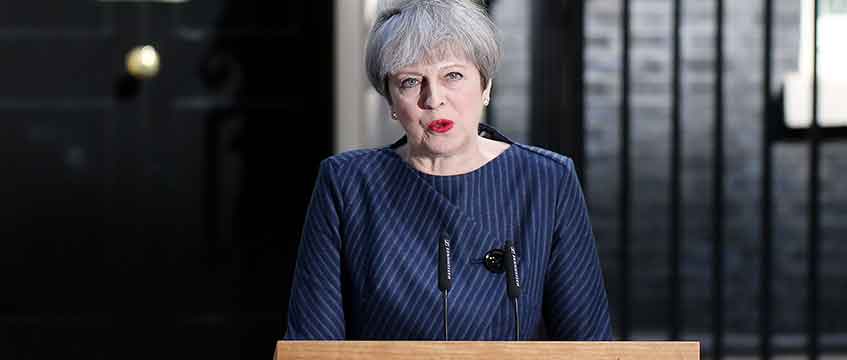Just two months ago, prime minister Theresa May was steering the country towards a hard Brexit. Now, after losing her majority in the snap General Election, following a resurgence in Labour support, she is being spectacularly pushed off course. While the additional uncertainty is not being welcomed by the industry, the hung parliament could actually present some opportunities for business.
“The people have spoken,” declared Conservative MP Anna Soubry on Sunday, saying the result showed the public had rejected a “hard Brexit”. Within hours of the result, Greg Clark, secretary of state for business, energy and industrial strategy, summoned business lobby groups – including the Confederation of British Industry, the Institute of Directors and the Federation of Small Businesses – to get a consensus on whether the government could ditch some of its less business-friendly policies.
A softer Brexit, retaining membership of the single market and the customs union, relaxing constraints on immigration and improved engagement with government are all back on the table. So will the real estate industry fight for a new direction?
A foot in the door
Widespread criticism of May’s close-circle leadership style means more engagement with business can be expected.
“It is not necessarily openness that the City wants to see more of, but actually constructive engagement,” says City of London Corporation policy chairman Catherine McGuinness. The Corporation is calling for mutual market access and a transitional agreement to help businesses prepare and the ability to attract the brightest and best from across the world. McGuinness hopes the election result will increase the Corporation’s chances of meeting the City’s demands. “We could well see the chances increase on changes to mutual access, perhaps through the single market, and on immigration controls,” she says. “But there is going to be a lot more discussion, especially within the government, as to how they might approach this.”
She adds: “The City has had a productive relationship with this government to date. But we need to keep making the case as to why a bad Brexit deal won’t simply affect Square Mile firms, but will also have an impact on the 2.2m financial and professional services jobs in the UK and the £72bn they contribute in taxes. It is also important to remember that finance affects everyone’s daily lives, from pensions to insurance policies and from bank accounts to mortgages.”
Knight Frank economist James Roberts agrees the City could benefit from the election result.
“We would expect a return to middle-of-the-road economic policies, as these will be the easiest to push through Parliament,” he says. “This will benefit both investment and occupier demand for commercial property, particularly in the office and industrial markets. A stronger defence of the London financial sector should benefit the City and Canary Wharf office markets.”
Barwell comeback

Former housing minister Gavin Barwell’s appointment as May’s chief of staff is seen as a big opportunity for the industry to access the ear of the prime minister.
The former Croydon Central MP, who lost his seat to Labour, replaces Nick Timothy and Fiona Hill, who had been May’s closest advisers – credited with shaping policy documents from the industrial strategy green paper to the ill-fated election manifesto.
Patrick Brown, head of insights and EU engagement at the British Property Federation, says he expects the property industry’s profile “will be raised” as a consequence of Barwell’s appointment. “There’s no doubt that Barwell has a challenging task ahead of him and big shoes to fill. We are confident that his previous dedication to ensuring that we can deliver homes and provide the places for people to work, live and play will shine through.”
Revo chief executive Ed Cooke also welcomes Barwell’s return. “There may have been internal political and personality issues within the inner sanctum of Number 10 and Cabinet,” he says. “But in terms of engagement with our sector, we feel it is generally positive and increasingly so. We welcome Gavin Barwell’s position as chief of staff – someone with credibility, widely liked and well regarded.”
To the left
The Conservatives remain in power. The prime minister, chancellor of the exchequer and secretaries of state for business and communities are unchanged. However, the resurgence of Labour and the strong turnout among younger voters have changed the policy agenda.
Does the industry need to engage more with the left? Cain Hoy chief executive Jonathan Goldstein says the shock General Election result is a message to the Conservative Party that the next government must take the issue of providing truly affordable housing more seriously.
“For the past year, the 48% have been ignored and the country has been driven down a road to a hard Brexit that I don’t think anybody actually voted for,” he says. “The UK has had a wake-up call. People will not be driven down a road, we are not a one-issue country and the political class needs to listen and learn from the messages that people give them across the country.”
Providing a lender’s perspective, Hayley Scott, of Investec Structured Property Finance, says there are some “encouraging ideas for the property and housing sectors in the Labour manifesto”, such as support for Help-to-Buy funding, giving long-term certainty to both first-time buyers and the housebuilding industry, and wholesale reforms of the rental sector and increased protection for the consumers.
“As long as policy does not impinge on viability, as active lenders into the Build-to-Rent sector we are supporters of these measures,” she says.
An uncertain world
A hung parliament and the prospect of another General Election in the short to medium term could bring about more uncertainty for the property industry and a short-term drop-off in activity. JLL head of UK capital markets Alistair Meadows says he expects the result to threaten some investment deals in the short term.
However, Toscafund chief economist Savvas Savouri says the economic fundamentals behind investment in UK property remain unchanged. “Nothing about the UK economy has changed fundamentally. You have the same chancellor in his role. You haven’t got John McDonnell.
“It would have been quite a different conversation had we had a less-robust Conservative Party in government requiring an informal coalition with the DUP.”
He adds: “Luckily we have the pound to shock-absorb. Quite frankly, if you are middle class in the US, across Europe or even Qatar, the UK looks like a sensible place to be.”
Asian investors will look at the UK and see the “weaker pound” and more affordable investment opportunities, he says. “The most important nation on this planet is China, and it’s not a country that has much time for elections. In fact, it has no time at all for elections.”
Greater certainty would be achieved if Brexit negotiations with the EU started on 19 June as scheduled, the industry agrees.
The BPF’s Brown says: “Delaying the commencement of negotiations, if they are to proceed, would shorten an already ambitious timeline to resolve the issues at hand.”
The City of London Corporation’s McGuinness says: “We would like to see the negotiations start as soon as is practically possible for both sides. We want see a good deal for Britain and we have a tight deadline. A delay will merely add to the uncertainty for business as they wouldn’t have a clear timetable to work to.”
While uncertainty reigns, the industry has a golden opportunity to make its voice heard.
Main image : James Gourley/Rex/Shutterstock
To send feedback, e-mail Louisa.Clarence-Smith@egi.co.uk or tweet @LouisaClarence or @estatesgazette











